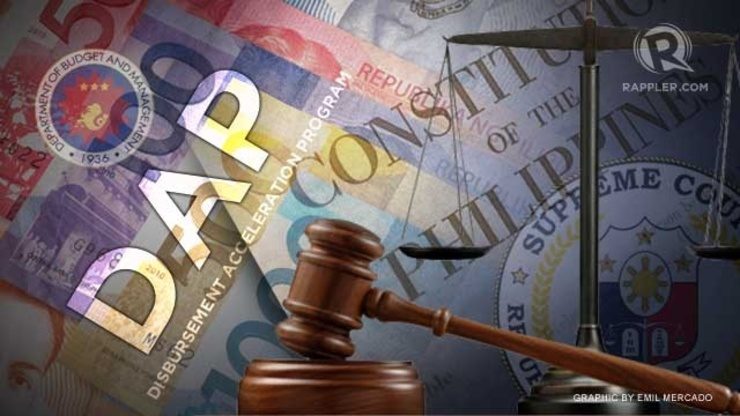SUMMARY
This is AI generated summarization, which may have errors. For context, always refer to the full article.

MANILA, Philippines – While not specifically mentioning “government savings,” President Benigno Aquino III indicated in his annual address that he wanted the budgetary term at the center of the controversial Disbursement Acceleration Program (DAP) to be clarified by Congress and not defined by the Supreme Court (SC).
The President recently hit the high court in a number of speeches after the SC declared unconstitutional 3 schemes under his administration’s spending program. The decision and the government’s defense of the DAP showed the two brances had different understanding of the “savings” that the Executive could legally move around.
In his 5th State of the Nation Address on Monday, July 28, Aquino said he will ask Congress to clarify in a joint resolution the definition of terms related to the DAP.
“Kasabay po nito, nananawagan din tayo sa pakikiisa ng Kongreso upang maipasa ang isang joint resolution na maglilinaw sa mga depinisyon at kaisipang tila pinagtatalunan pa – at iba pang mga usaping kayo lang sa lehislatura, bilang mga nagsulat ng batas, ang makakapaglinaw,” Aquino said.
(Simultaneous to this, I am appealing for the cooperation of Congress to pass a joint resolution that will clarify the definition and concepts still being debated upon – and other matters that only the legislative, as makers of the law, can clarify.)
Budget Secretary Florencio Abad said in an interview with the ABS-CBN News Channel on Monday that key acts under DAP declared unconstitutional by the SC on July 1 are “statutory construction issues.”
Aquino’s move to ask Congress to clarify budgetary terms in relation to the DAP may be tilted toward his favor. Administration allies outnumber those of the opposition in Congress.
In comparison, if the issue is left to the discretion of the court, prospects are very poor for the definition that Aquino prefers. His 4 appointees in the SC voted with the 9 other justices to declare key DAP acts unconstitutional.
While the President did not specify in his SONA what terms he wishes Congress to clarify, his government earlier argued that the definition of government savings is not outlined in the Constitution but is instead “legislatively determined.”
Government lawyers argued that the high court cannot tag the government’s alleged transgression in implementing DAP as a violation of the Constitution.
DAP is a spending program initiated by the Aquino administration in 2011 to pump-prime the economy by transferring savings and as well as allocations for slow-disbursing projects, activities, and programs to fast-disbursing ones.
Motion for reconsideration
The Aquino government earlier assailed the SC’s interpretation of what government savings are.
“To require that savings may only be incurred at or near the end of the year (or the validity of the appropriation) and then mandate that all yearend savings must go to the National Treasury is to operationally defeat the President’s power to augment,” the government’s motion for reconsideration read.
The SC ruled as unconstitutional the declaration of savings before the end of a fiscal year, as it would be contrary to the definition of savings under the General Appropriation Act (GAA).
This is because a project, activity, or program cannot be declared unfinished or abandoned mid-year, and the GAA defines government savings as funds from abandoned or unfinished projects, completed projects, and vacancies in government positions.
In asking Congress to clarify the definition of savings, Aquino and Abad were reiterating an argument raised in the government’s motion for reconsideration against the SC ruling on DAP.
In the motion, government lawyers argued: “The court’s interpretation of savings is not a statement of a constitutional rule but merely an [unnecessary] interpretation of an act of Congress. If at all, any administrative non-compliance with the Congress’ definition of savings cannot trigger a declaration of unconstitutionality.”
The motion further read: “The undeniable fundamental question with respect to the issue of savings is whether the government violated the parameters set by the relevant GAA preparatory to the President’s exercise of his constitutional authority to augment. This question is clearly not a constitutional matter – it is an ordinary species of statutory interpretation involving the proper reading of the Congress’ definition of savings in the GAA.”
Liability
The Aquino government is under fire for implementing the DAP, key acts underwhich were declared unconstitutional by the SC.
Two impeachment complaints have been lodged against Aquino over the spending program.
The declaration of unconstitutionality has triggered a debate on whether Aquino and Abad should be held liable for executing or approving the execution of the unconstitutional acts.
The SC ruled that a finding by a proper tribunal indicating that implementors acted in good faith will exonerate them of liability.
Among those declared unconstitutional by the high court are:
- the declaration of savings contrary to the definition provided by the GAA and its subsequent transfer to augment another budget item
- the cross-border transfer of funds or using the funds allotted for the executive branch for budget items under another branch of government
- the transfer of funds to items not outlined in the GAA.
– Rappler.com
Add a comment
How does this make you feel?
There are no comments yet. Add your comment to start the conversation.